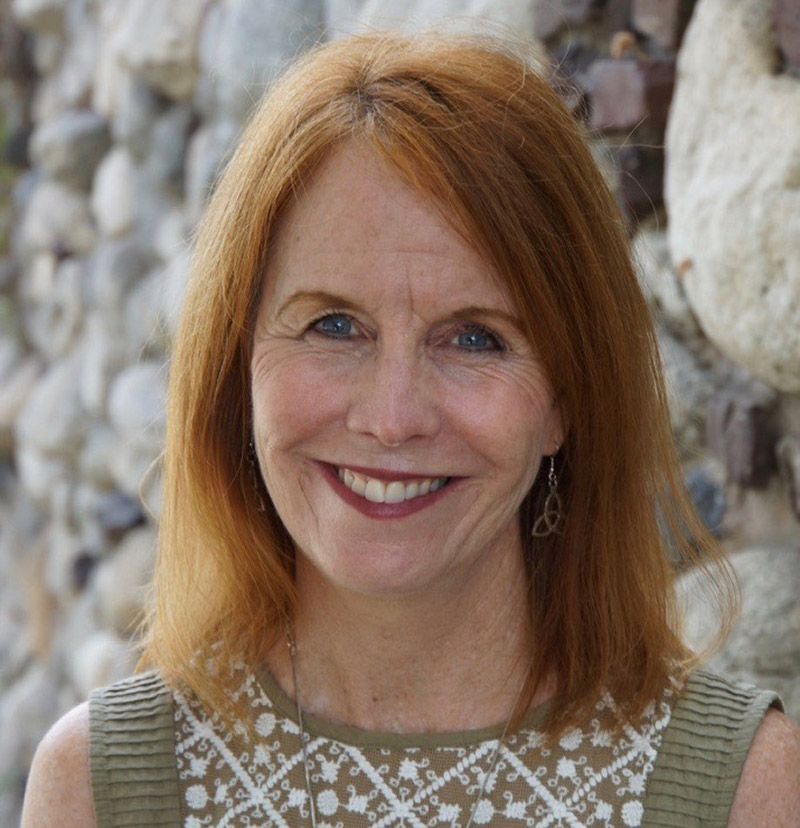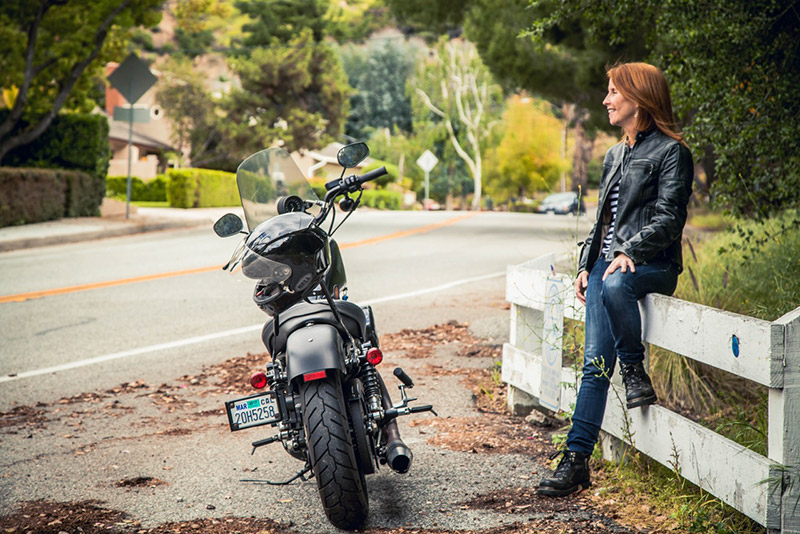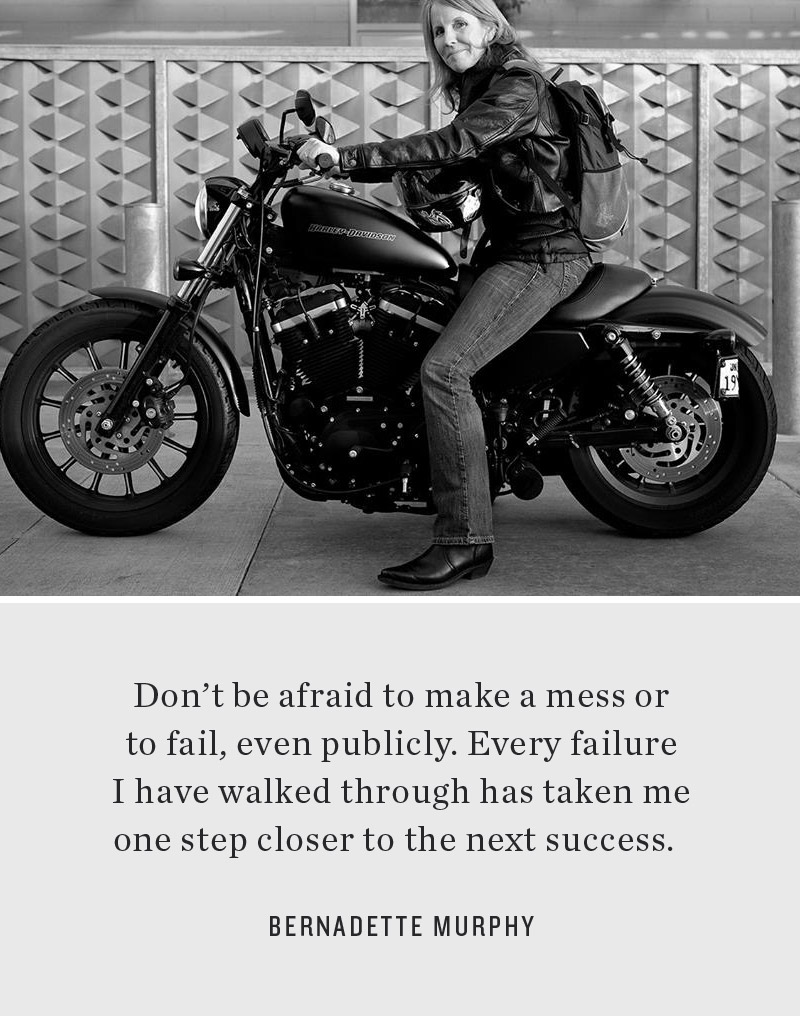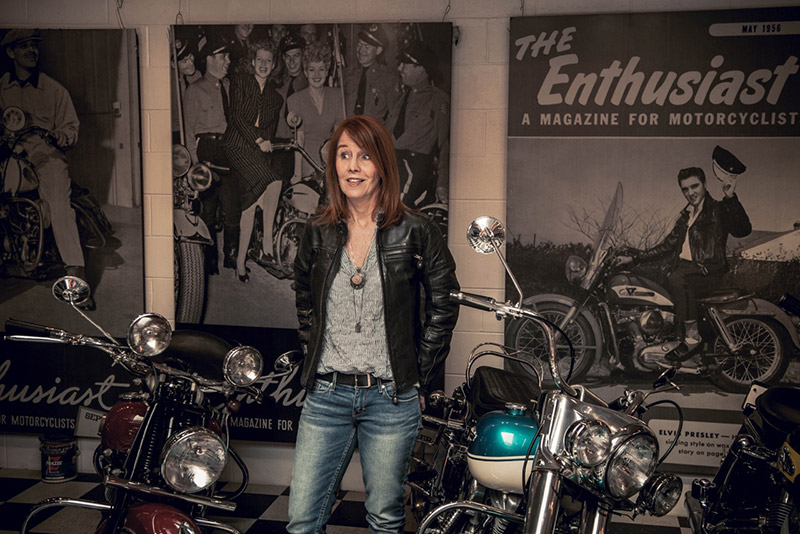To do the work you love, you’ve got to unlock a few doors. UNLOCKED Stories are honest conversations with people who chose a path and made it happen.
A note from Ellen:
At age forty-eight, Bernadette Murphy decided to learn how to ride a motorcycle. It was a pretty bold choice for a “settled wife” with three kids. But she went for it—and the experience transformed her life forever.
If you’ve ever felt like it’s “too late” for you to learn a new skill—or transform your life and career—because you’re too old, or you don’t have the right connections, or you don’t have enough money, or it just feels too scary, I urge you to read this interview with Bernadette.
Her story proves: it’s never too late to step away from what’s “predictable” and pursue what you honestly want.
What do you do?
[Bernadette]: I write—mostly essays and books, including memoir and narrative nonfiction.
Harley and Me: Embracing Risk on the Road to a More Authentic Life is my most recent book, published in May 2016. It combines memoir with research into the neuroscience/psychology of risk taking to answer the question: “What happens when women in midlife step out of what’s predictable?”
For me, learning to ride a motorcycle at forty-eight became the catalyst that transformed me from a settled wife and professor with three teenage children into a woman on my own. The confidence I gained from mastering the motorcycle gave me the courage to face deeper issues in my life and start taking risks. It’s a fact that men and women alike become more risk averse in our later years—which according to psychologists and neuroscience is exactly what we should not do.
My bestselling book, Zen and the Art of Knitting, looked into the metaphysics of fiber art through a combination of memoir and reportage.
It’s kind of a weird oeuvre: knitting to motorcycles, but it’s what I do.
In addition to writing books, I am also professor of creative writing, working with graduate students at Antioch University Los Angeles, and a writing coach/editor in private practice.
What were you doing before you became a motorcycle-riding memoirist?
[Bernadette]: I’ve always been a writer, though in my younger years I used my writing skills as a journalist and a public relations/advertising copywriter.
It wasn’t until I was in my 30s that I began to recognize the stories I had to tell—those tales that plumb the human condition and hopefully make readers feel less alone.
Once I realized I had these stories, the inner pressure to tell them well began to build. I went back to graduate school at that point—as a mother of three small children—and started on this path of being a full-time author, writing stories that mattered to me.
What is your favorite part about your work?
[Bernadette]: When I’m on a roll with my writing, and time disappears, and a project that seemed a mess yesterday starts to shift and change and find its own shape right before my eyes—that’s my favorite part. It’s like watching magic happen.
I’m aware that the magic can’t happen if I don’t show up to do the work, or if I just wait for inspiration to strike, or if I refuse to make my way through those painful moments when everything I write sucks and I wonder if I have any clue about what I’m doing. But if I persevere through those times and simply keep going, eventually: magic.
I also love working with students and emerging writers as they begin to find and focus their own voice, and watching that same magic happen for them.
What is your least favorite part about your work?
[Bernadette]: I’m not a fan of the book tour/publicity stage. Right now, I’m learning to master social media stuff and I have to be in the public eye more than I’m comfortable with. It’s one thing for my stories to be out there. It’s another when I have to bring my physical self into the spotlight. That exposure makes me squirm.
How do you typically begin your day?
[Bernadette]: Before I’m fully awake, I feed Gates, my fox terrier rescue dog, walk him, and then settle down for 20 minutes of meditation. Once I’ve centered myself that way, then coffee, email, and writing are next.
When you’re having a difficult or stressful day, how do you get through it?
[Bernadette]: Sometimes I just walk away. I get up from the computer and take Gates for a walk in the park next door to break up the day and get a fresh start. Or I take a bath. Or go for a massage if I can fit it in. Another session of mediation always helps. Anything to interrupt the negative momentum that has started rolling.
What has been the most challenging chapter of your career so far? (A roadblock, setback, or “locked door” moment?)
[Bernadette]: There have been a lot of them—too many to list here! Being a writer, I think, is a huge lesson in being knocked down and getting back up. Over and over and over again.
Here’s one example: two years ago, I moved to the island of Mo’orea in French Polynesia on sabbatical from my teaching job to finish Harley and Me. While there, I sent the third fully revised 90-page proposal to my literary agent, and I was sure I had finally nailed it. She wrote back, not at all happy with the proposal and making it clear that we didn’t see eye-to-eye on this project.
Unlike my three previous books, which she sold based on rather short and easily created proposals, this one was taking so much more work. I wasn’t sure if she was wrong or I was wrong or what do to next. I was utterly adrift—and so depressed I could hardly move. Here I was in paradise to do this one thing, and now I was no longer sure that I could do it.
How did you get through that “locked door” moment?
[Bernadette]: I spent the next few days in a state of complete surrender. Maybe I needed to give up the agent, with whom I’d had a longstanding work relationship and who was a heavy hitter in the book world. Maybe I needed to give up this particular book project. Maybe my writing career had run its course and was coming to an end. I had to be willing to let go of everything and completely surrender to any and all of these possibilities.
When I quit fighting for things to be the way I demanded them to be, a new, better version of the book began to take shape. I found I could do exactly what I wanted to do with this project and meet my agent’s suggestions as well. Her suggestions, in fact, greatly strengthened the work. But when I first received them, I couldn’t see that possible outcome. I was too afraid of the challenge she had put before me and hadn’t yet learned to trust that I could do it. It was easier to think she was wrong and didn’t understand my project than to see that what she was suggesting was a good and necessary thing.
It’s obvious that you’re so passionate about writing—but do you ever fantasize about having a totally different career? What would it be?
[Bernadette]: Yes and no. I really think I have the best career possible for me. I wouldn’t trade it for anything. But I’d love to have a few other careers in addition to my writing. I’d love to be an outdoor adventure guide, a musician, a Ranger in a National Park, an athlete, a coach. The list goes on and on.
Who are your personal heroes and role models?
[Bernadette]: The women who have showed me how to do this thing called “life.”
I raised three kids, but I did so having no role model. My mother was seriously mentally ill and institutionalized during much of my childhood. When I become a mother myself, other women in my life stepped up to show me how to do it.
Women writers, likewise, have been my biggest supporters, reading drafts of my work, putting me in touch with people who may help my career, holding me accountable for what I say I’m going to do, and cheering me on from the sidelines.
What’s the next door that you need to unlock? (And what’s the plan?)
[Bernadette]: I’m working on a novel now that I started some 18 years ago. It’s very close to the bone for me and I’ve completed at least five drafts of it that failed to satisfy me.
I’m going to try it once again, but this time the plan is to nail it once and for all or cut it loose. To do so, I’m making a specific, month-by-month work schedule that I will ask a writing friend to hold me accountable to.
This time, either the novel works or it doesn’t, but I have decided that after this attempt, I can’t keep dragging this albatross behind me any longer. I’m like a sailboat with my sail set just right into the wind, ready to move forward, and this book has become an anchor I’m dragging behind me. I need to take this one last attempt and then be done with it.
I’m wishing you smooth sailing with that project! Last but not least: what’s your biggest piece of advice for anyone who wants to do amazing work in the world, stay motivated, and unlock major doors?
[Bernadette]: Will power is great, but a plan is better.
Learn to prize what’s important in life rather than what’s urgent. There will always be urgent things trying to get your attention and pull you away from what you truly value—laundry, dishes, the needs of others. Our culture values us when we take care of all those urgent things, when we’re productive that way. But if we only do what’s urgent, we’ll never get to focus on what’s truly important to us.
Don’t be afraid to make a mess or to fail, even publicly. Every failure I have walked through has taken me one step closer to the next success. When I play it safe and try to avoid messes and failure, I miss the success that might have been birthed through the failure.
People are quick to warn you about all the lurking perils if you take risky options. But no one tells you about the death that occurs, slowly, like the frog swimming in a pot of increasingly heated water, if you don’t put your true self on the line. We only get one go-around at this rodeo (to the best of my knowledge). I want to be fully alive and fully me in the time I have on this planet.
UNLOCK YOURSELF
Three questions to think about, write about—or talk about with a friend.
1. Bernadette hopped onto a motorcycle at age forty-eight and her life changed forever—in very surprising ways.
Is there something you’ve always wanted to do (ride a Harley, visit Bali, take a drawing class, run a 5K, etc) that you’ve been postponing? What’s stopping you?
2. While preparing to write her latest book, Harley and Me, Bernadette experienced a period of overwhelm, stuckness, and depression, and temporarily wondered if she should even continue writing at all.
Do you ever feel like “walking away” from your entire career? Do those feelings come often? Or just occasionally? What do you say to yourself in those moments? What helps you?
3. Bernadette loves when she feels “on a roll” with her writing—in the zone, in that trance-like flow-state where time seems to disappear.
When do you feel “in the zone”? Can you remember the last time that you felt so immersed in a project that you barely noticed time passing? What were you doing? What was happening?
For more UNLOCKED interviews, click over here.
Know somebody that ought to be spotlighted? Write to me here.
See you next time for another inspiring conversation!
![]()




